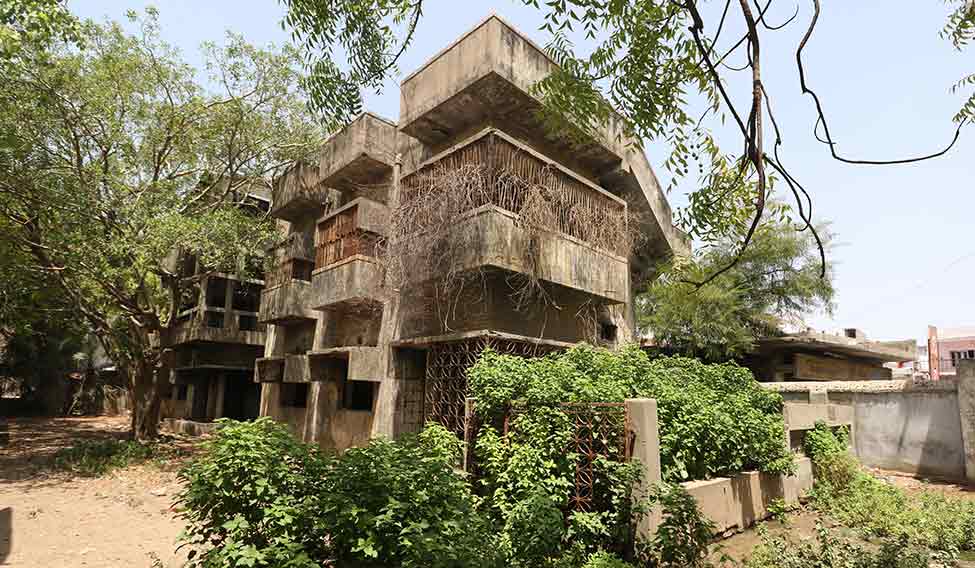A pall of gloom hangs over the deserted Gulbarg Society in Ahmedabad. It had once been a vibrant residential colony, with a cluster of bungalows and apartment buildings that housed mostly upper- and middle-class Muslims. But, with the buildings gone to seed, its walls covered with soot and overgrown vegetation, it now resembles a haunted house. Apart from stray dogs and cattle, and a lone man who makes mattresses, the only thing that keeps the place alive is the sound of namaaz being offered at a nearby mosque.
On February 28, 2002, a mob of more than 15,000 descended on Gulbarg Society, looting houses, setting them afire and killing 39 people on the spot, including former Congress MP Ehsan Jafri. Thirty persons who went missing were later declared dead.
The attack was part of the violence that spread across Gujarat after the burning of coach S6 of the Sabarmati Express in Godhra the previous day, which had resulted in the death of 59 persons, most of them volunteers returning from Ayodhya. As the mob approached the gated Gulbarg Society raising anti-Muslim slogans, most of the residents took refuge in Jafri’s house. Jafri made frantic phone calls to the police and top politicians, but they allegedly went unanswered. Within two kilometres of Gulbarg Society were two police stations and the commissioner’s office. Still, no one came to help and the attack reportedly lasted for more than five hours.
Fourteen years after the incident, a special court in Ahmedabad gave its verdict on the case. On June 2, Judge P.B. Desai convicted 24 of 66 accused. Eleven persons were convicted of murder and 13 of lesser offences. They will be sentenced on June 9.
The court, however, said there was no evidence of criminal conspiracy and dropped section 120B of the Indian Penal Code from the list of charges. It also acquitted 36 people, including a BJP corporator in Ahmedabad. The remaining six accused had died during the course of the trial.
The inquiry into the Gulbarg Society case was carried out by a special investigation team headed by former CBI chief R.K. Raghavan, appointed by the Supreme Court to look into nine major cases related to post-Godhra riots. The Gulbarg Society case was the eighth case on which the special court delivered its judgment. Only one remains—the Naroda village riot case.
Families of the victims of the Gulbarg Society massacre say justice has not been done. They point out that more than half of the accused were let off; more importantly, the criminal conspiracy charge was not upheld, unlike in cases related to the massacres at Naroda Patiya in Ahmedabad and Ode in Anand district, which had happened around the time of the Gulbarg Society killings.
The post-Godhra violence had a pattern: armed mobs attacking Muslim neighbourhoods, destroying property and killing people. As the full judgment of the Gulbarg Society case is yet to be released, it is difficult to say what prompted the court to drop the conspiracy charge.
“A mob of 15,000 would not gather to watch a movie,” activist Teesta Setalvad of the Citizens for Justice and Peace (CJP) told THE WEEK. “The mob that had gathered was raising slogans. It was not flash-in-the-pan kind of incident. And the police commissioner’s office was only two kilometres away.”
One of the acquitted persons was K.G. Erda, the inspector who had made wireless calls for sending reinforcements to Gulbarg Society. “If Erda is acquitted, who is to be blamed for not being able to stop the crime? Those who failed have to be made accountable,” said activist Nirjhari Sinha, who analysed call records of persons accused in various riot cases.
According to her, the matter of police failure did not come up in any of the cases. Also, she said, no departmental inquiry was initiated against erring police personnel.
The families of the victims are gearing up to challenge the verdict. Setalvad said the CJP had given 2,000 pages of call records to the investigators. According to sources, one of the key demands in the appeal would be proper analysis of the records.
Apparently, when violence spread across Ahmedabad in February 2002, several leaders of the BJP and the Vishva Hindu Parishad were in touch with each other. The phone numbers of key persons in the chief minister’s office also figure in the call records. Some of the persons whose numbers figure in the records are VHP leader Jaydeep Patel, an accused in the Naroda village case, and Bipin Patel, the BJP corporator in Ahmedabad who was acquitted in the Gulbarg Society case.
Rupa Mody, whose son Azhar went missing during the riot, said she had personally talked to then police commissioner. “My brother-in-law was sitting in the commissioner’s office and I spoke to him,” she said. “He asked me for our address. The moment I said we were in Jafri’s house, he said he would take down the address and disconnected the phone.” Mody, a Parsi, pointed out that the arms, ammunition and chemicals used in the attack were sourced in a night. “The attacks were not chutput [scattered and small],” she said.
Abhay Bhardwaj, counsel for the convicts, insisted that there was no conspiracy. He told THE WEEK that the mob that had gathered outside the society had limited itself to raising slogans. The attack began only after Jafri fired at them without provocation. “Had it been a conspiracy, why would they have waited for hours before attacking?” he asked.
The judgment leaves a lot of questions unanswered, and that is what gives hope to the victims’ families as they prepare to challenge it. Up for hearing next is a petition filed by Jafri’s widow, Zakia, in which she alleges a larger conspiracy involving Prime Minister Narendra Modi, who was Gujarat chief minister at the time of the riots. “Our battle is not over yet,” Jafri’s son Tanvir told THE WEEK. “It would continue in the High Court and the Supreme Court.”







